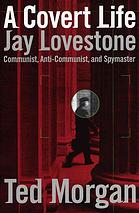
A Covert Life
Jay Lovestone: Communist, Anti-Communist, and Spymaster
کتاب های مرتبط
- اطلاعات
- نقد و بررسی
- دیدگاه کاربران
نقد و بررسی

March 1, 1999
Morgan (biographer of Winston Churchill, Franklin Delano Roosevelt, William S. Burroughs and Somerset Maugham) turns his attention this time to the not-so-famous but intriguing Jay Lovestone (1897-1990). Born Jacob Liebstein, Lovestone kept reinventing himself, altering not only his name but also his resume, his personality and his ideology. He was a youthful leader of the American Communist Party during the 1920s, when many intellectuals found the Soviet experiment irresistible. Some of the most absorbing passages of the book--helped greatly by recently opened Comintern files to which Morgan had access--concern the ferocious infighting among American Communists. Lovestone and a band of his supporters went to Moscow in 1929 to plead their case before a special Comintern committee headed by Stalin. Lovestone found himself on the wrong side of Stalin, expelled from the American Communist Party and, most frighteningly, stuck in Russia with no friends and without his passport. He escaped Moscow, made his way back to the States and embarked on a successful career as a professional anti-communist. He collaborated especially closely with CIA spymasters, including James Angleton. Of Lovestone's contributions to the Cold War, Morgan writes: "He was the coach rather than the player, the master kibbitzer, the prompter in the box, not the actor in the stage." Morgan does a great job of summarizing Lovestone's work, but, precisely because Lovestone threw himself almost exclusively into that work, there is very little with which to humanize him. Readers looking for more than a symbol of a century's ideological turmoil may find Morgan's Lovestone at once remote and exhausting.

February 15, 1999
Until 1929 the American Communist Party under Lovestone's leadership asserted its autonomy from the Soviet Union. That year Stalin, backed by his Comintern, expelled Lovestone and his followers from the party. The expulsion, the pivotal episode in this biography, began Lovestone's slow transformation into a zealous cold warrior, a process Morgan explores completely. Lovestone's rightward shift wasn't immediate, as he tried to organize a rival party. The effort having fizzled by the late 1930s, Lovestone edged toward the noncommunist labor movement, eventually becoming the AFL's "foreign minister" on behalf of its leader, the redoubtable George Meany. In the 1940s, Meany's postwar aims abroad were to support anticommunist union brothers in France and Italy, beleaguered by the communist unions. That suited the nascent CIA, thus beginning Lovestone's activities not as an agent but as a conduit of support for anticommunists. A life spun around several times by fortune's wheel, Lovestone's colorful career comes alive in Morgan's capable presentation. ((Reviewed February 15, 1999))(Reprinted with permission of Booklist, copyright 1999, American Library Association.)

























دیدگاه کاربران